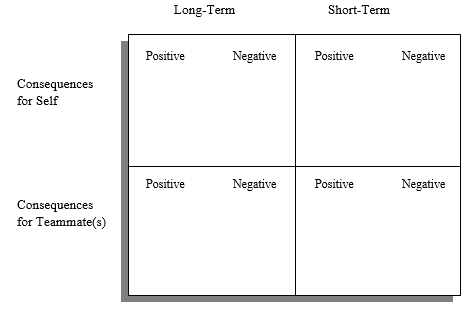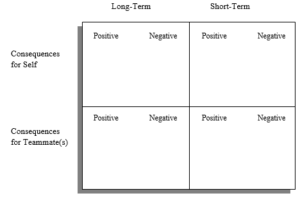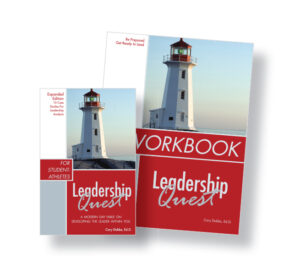2 articles contributed by Dr. Cory Dobbs.
How Will Your Decisions Help or Hurt Your Teammates?
A short, but very powerful post to share with your athletes.
You will make better decisions if you focus on how the consequences of your actions affect your teammates. While this is only one criterion which can and should be applied to any decision you make, it is an important one. You begin by asking “What will happen to my teammate(s) if I act upon this decision? Over time, such reflective thinking will become habit.

Decision-Making
-I should act on this decision.
-I should not act on this decision.
-I cannot decide at this time (Need more information, time, etc.)
Using this matrix will not guarantee that your decisions will be good ones. However, the consideration of the consequences of a given decision in terms of one’s self and one’s teammates in the near and distant future should increase the probability that harm to relations and relationships can be avoided.
Reflection and Discussion Questions
- Do you agree with the idea that the best decisions are those that have the most positive consequences for you and your teammate? And that the poorest decisions are those that have the most negative consequences? Give an example to explain your reasoning.
- How do you know positive consequences will result from your action(s)? Inaction?
- How do you know negative consequences will result from your action(s)? Inaction?
- In which of the four quadrants would you find the most “immature” behavior? Why?
- As a team member, how can you use this matrix to help your teammates make better decisions?
Article #2
The People Principle
Nothing is More Fundamental to Tap Human Potential than the Power of Relationships
Think about this: How often do your decisions and actions influence the direction of a student-athlete’s life? It’s an incredibly humbling thought, isn’t it? That a person’s life-direction can be guided by your views, your values, and your choices.
Simple truths are often overlooked, yet powerful in action. Nothing is more fundamental to tap human potential than the coach and player relationship—let’s call this **The People Principle.**
The People Principle, when applied, increases the utilization of human potential in the team and school settings, creating conditions that generate commitment to a meaningful experience. The skillful and authentic use, or neglect, of The People Principle can make the difference between change for the better or no change at all in the student-athlete.
As a coach, administrator, and educator of young student-athletes your ability to help them become their best is perhaps your greatest responsibility. Yes, you need to win to validate your coaching skills and abilities, but how do you know when you’re succeeding in developing future leaders and people of character? How do you nurture, challenge, and build young people up, equipping them to make a difference in the lives of the people they’ll interact with throughout their lives?
NEW RESOURCE FOR COACHES
In Leadership Quest Dr. Cory Dobbs offers student-athletes a leadership fable that is engaging, instructive, and transformative. This book provides a simple, yet powerful, model of leadership that will build confident and effective team leaders for any sport. Using the power of storytelling, Leadership Quest presents a proven framework for student-athletes to follow and become exceptional leaders on the playing field and in everyday life. Leadership Quest advances an athlete-centered approach to developing the leader within each and every student-athlete.
Click here for more information on the: Leadership Quest Pack
About the Author
Dr. Cory Dobbs is a national expert on sport leadership and team building and is the founder of The Academy for Sport Leadership. A teacher, speaker, consultant, and writer, Dr. Dobbs has worked with professional, collegiate, and high school athletes and coaches teaching leadership as a part of the sports experience. He facilitates workshops, seminars, and consults with a wide-range of professional organizations and teams. Dr. Dobbs previously taught in the graduate colleges of business and education at Northern Arizona University, Sport Management and Leadership at Ohio University, and the Jerry Colangelo College of Sports Business at Grand Canyon University.









